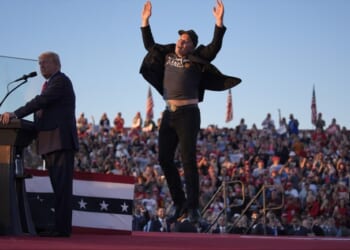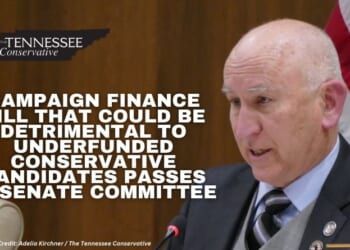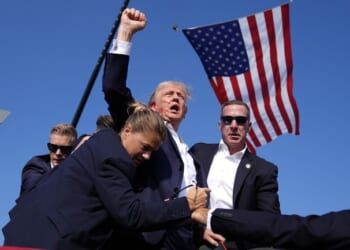WILL MARCO RUBIO be the first world statesman to take on the globalists’ dangerous ‘liberal world order’ delusion? We must hope that he lives up to his promise. Two days before Sen. Marco Rubio (R-Fla.) faced his Senate Committee on Foreign Relations hearing for his Secretary of State Senate confirmation, he gave Breitbart News an exclusive preview of his speech which focused, as they highlighted, on taking the globalist foreign policy establishment to task. https://www.breitbart.com/politics/2025/01/14/exclusive-marco-rubio-to-shred-globalists-in-confirmation-hearing-liberal-world-order-not-just-a-fantasy-but-dangerous-delusion/
Breitbart described his criticism of the globalist elites, who have dominated the American foreign policy worldview for the last several decades since the end of the Cold War, as ‘vicious’.
In the foretaste of his speech shared with Breitbart, Rubio set the scene by arguing that ‘in the decades that followed [the Second World War], the global order they created served us well. For Americans, incomes rose and communities flourished. Alliances emerged in the Indo-Pacific and Europe that led to the emergence of stability, democracy, and prosperity in these regions, and prevented a cataclysmic third world war. And ultimately a wall in Berlin came down and with it, an “evil empire”.’
However, once the U.S. won the Cold War and the Berlin Wall came down, Rubio told them, a ‘dangerous delusion’ of grandeur settled into the globalist elites’ mindset: ‘They thought they reached “the end of history” and that a “liberal world order” would overtake national identity.
‘Out of the triumphalism of the end of a long Cold War emerged a bi-partisan consensus that we had reached “the end of history” […] That all the nations of earth would become members of the democratic Western-led community. That a foreign policy that served the national interest could now be replaced by one that served the “liberal world order”. And that all mankind was now destined to abandon national identity, and we would become “one human family” and “citizens of the world”. This wasn’t just a fantasy; it was a dangerous delusion.’
Rubio, the son of Cuban immigrants who fled communism and built a stable life in the United States, also warned of the challenges presented by communist regimes, notably China. In his confirmation hearing, he promised a robust foreign policy agenda that will prioritize U.S. interests and restore the global order, which he says that Beijing and other adversarial nations have weaponized to their advantage. Even more importantly, he laid out how this obsession with a new global order for the past few decades has led to trade, immigration, and national security policies that have devastated America’s working and middle class:
‘Here in America, and in many of the advanced economies across the world, an almost religious commitment to free and unfettered trade at the expense of our national economy, shrunk the middle class, left the working class in crisis, collapsed industrial capacity, and pushed critical supply chains into the hands of adversaries and rivals,’ going on to say that ‘an irrational zeal for maximum freedom of movement of people has resulted in a historic mass migration crisis here in America and around the world that threatens the stability of societies and governments. And across the West, governments now censor and even prosecute domestic political opponents, while radical jihadists openly march in the streets and drive vehicles into our people.’
His main crack, however, was at China: ‘While America far too often continued to prioritize the “global order” above our core national interests, other nations continued to act the way countries always have and always will, in what they perceive to be in their best interest […] And instead of folding into the post-Cold War global order, they have manipulated it to serve their interest at the expense of ours.’
A longtime China hawk, Rubio was twice placed on Beijing’s sanctions list in 2020 for his human rights advocacy. He views the Chinese regime as ‘the most potent and dangerous, near-peer adversary this nation has ever confronted. They have elements that the Soviet Union never possessed’, he said, continuing, ‘They are a technological adversary and competitor — an industrial competitor, economic competitor, geopolitical competitor, a scientific competitor’.
‘We’ve allowed them to get away with things, and frankly, the Chinese did what any country in the world would do, given these opportunities — they took advantage of it.’
If the United States doesn’t change course, Rubio warned, it will soon head into a world where ‘virtually everything that matters to us in life’ — from our security to our health — ‘will depend on whether the Chinese allow us to have it or not’.
He accused the Chinese Communist Party of taking advantage of all its benefits, of ignoring all its obligations and responsibilities: ‘Instead, they have lied, cheated, hacked, and stolen their way to global superpower status, at our expense.’
However, he then broadened his critique:
‘In our very own hemisphere, despots and narco-terrorists take advantage of open borders to drive mass migration, traffic women and children, and flood our communities with fentanyl and violent criminals. And in Moscow, Tehran, and Pyongyang, dictators sow chaos and instability and align with and fund radical terror groups, then hide behind their veto power at the United Nations and the threat of nuclear war. The postwar global order is not just obsolete; it is now a weapon being used against us.’
Creating a free world out of chaos once again, he said, won’t be easy. It means putting core national interests above all else once, again citing President Trump’s first term in office when, he says, American strength did act as a deterrent to adversaries and gave leverage in diplomacy. ‘There were no new wars, ISIS was eviscerated, Soleimani was dead, the historic Abraham Accords were born, and Americans were safer as a result.’
Keir Starmer may feel the impact of this approach straight away. Rubio has already said that giving away the strategic Chagos Islands to Mauritius could help China’s military ambitions in the Indo-Pacific.










